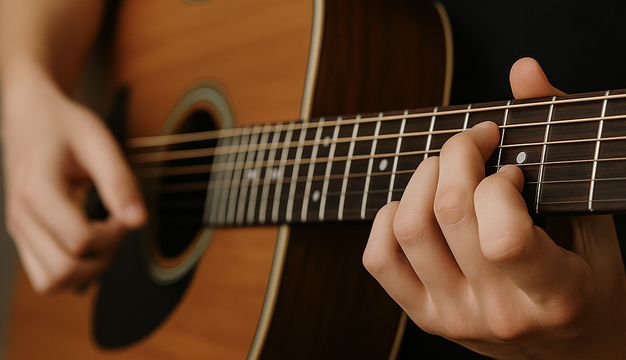Guitar Theory Lessons Brighton
If you’re a guitarist who’s ready to go beyond basic chords and riffs, it’s time to dig into guitar theory. At Brighton Music Academy in Brighton, Michigan, we specialize in guiding students through the deeper aspects of music—scales, harmony, intervals, and more—all tailored for both acoustic and electric guitar players.
📍 BOOK NOW: Schedule a Guitar Theory Lesson at Brighton Music Academy
Why Guitar Theory Matters for Students in Brighton
Understanding guitar theory is like unlocking the language of music. Instead of memorizing random shapes and patterns, you begin to recognize how chords and scales fit together. For students in Brighton, Michigan, learning theory through real songs and practical applications enhances everything—from improvisation to songwriting.
Who Should Study Guitar Theory?
This program is designed for intermediate and advanced players who already know basic open chords and scales. If you’re asking questions like “Why does this chord sound good after that one?” or “How do I create a solo that fits the song?”—you’re ready.
What Does Guitar Theory Cover?
Guitar theory bridges the gap between the notes you play and why you play them. At Brighton Music Academy, our theory instruction includes:
- Intervals – Understand the distance between notes
- Chord Construction – Learn what makes a major, minor, or diminished chord
- Scales and Modes – Master the major scale and its cousins
- Progressions and Harmony – Play by ear and build songs from scratch
Understanding Intervals on the Fretboard
Intervals are the foundation of both chords and melodies. You’ll learn to recognize major thirds, perfect fifths, and more—by sight, sound, and feel.
The Logic of Chord Shapes
Guitar chord shapes aren’t random. Once you understand how intervals create shapes on the fretboard, you’ll be able to play any chord in any position. Barre chords, triads, and inversions will finally make sense.
How Scales Connect Across the Neck
You may already know a few scale shapes, but how do they connect? We’ll show you how to move seamlessly across the neck using major, minor, pentatonic, and modal patterns.
Scale Patterns vs. Scale Theory
Playing a scale and knowing a scale are different things. Learn how different scales function over chords and what makes each one special.
Harmonizing the Major Scale
Turn scales into chords. By harmonizing the major scale, you’ll understand chord progressions and what options you have in every key.
The Circle of Fifths for Guitarists
The Circle of Fifths is a roadmap to understanding key changes, modulation, and musical relationships. And yes—it’s easier to grasp on guitar than you think!
Chord Progressions and Voice Leading
Learn why some chord progressions sound smooth and others don’t. Voice leading teaches how to connect chords in a logical, musical way.
How to Apply Theory to Improvisation
Theory isn’t just for composers—it’s for shredders too! Understand how to solo in any key using modes, arpeggios, and target tones.
Using Guitar Theory to Write Songs
Want to write your own music? Guitar theory gives you the tools to build original chord progressions, melodies, and harmonies that work.
The Role of Modes in Guitar Playing
Dorian, Mixolydian, Lydian—mysterious names that unlock new tonal colors. Discover where and when to use modes for lead guitar and songwriting.
Understanding Cadences and Musical Punctuation
A cadence is how music “lands” or finishes a thought. You’ll learn perfect, plagal, and deceptive cadences and how they shape songs.
Ear Training and Theory Go Hand-in-Hand
Knowing theory helps your ear—and vice versa. You’ll start hearing chord qualities, intervals, and scales automatically after enough exposure.
Visualizing Theory on the Guitar Neck
Theory is easier to learn when you see it. Guitarists benefit from seeing patterns on the fretboard, and our lessons are built around this visual approach.
Common Mistakes Students Make with Theory
Many students treat theory as an academic subject—disconnected from their playing. Our method keeps it relevant, musical, and practical from day one.
How Our Instructors Make Theory Accessible
Our teachers are skilled in breaking down complex ideas into bite-sized, playable lessons. Whether you’re into classic rock or jazz fusion, we’ll speak your musical language.
🔗 Learn about our guitar instructors and philosophy:
Brighton Guitar Lessons
Guitar Theory Lessons for Acoustic vs. Electric
Though the instruments differ in sound, theory is universal. Acoustic players benefit from chord theory for accompaniment, while electric guitarists often use theory for solos and song construction.
Lessons Tailored to Your Genre
You don’t need to be a classical musician to benefit from theory. Whether you play blues, rock, metal, pop, or folk—understanding the music behind the music makes you better.
Practice Tools and Exercises We Recommend
We’ll introduce you to:
- Scale diagrams and apps
- Backing tracks for improvisation
- Printable theory charts
How Long Does It Take to See Progress?
Most students see tangible benefits after a few weeks of consistent lessons and practice. Like anything, the more you apply theory to your daily playing, the faster you’ll grow.
Group or Private Guitar Theory Lessons?
Private lessons are best for deep theory, but we also offer group theory classes where students can explore concepts in a collaborative setting.
Student Feedback and Success Stories
“I finally understood why certain chords sounded good together.”
“Theory helped me write my first song!”
“Learning scales used to be boring, now I love it.”
Get Started with Guitar Theory in Brighton
Take your guitar skills to the next level by mastering the musical concepts that shape every riff, solo, and song.
🎯 Book your guitar theory lesson now:
👉 Schedule Here
Other Programs You Might Like
🎤 Private Voice Lessons Brighton
🎸 Brighton Guitar Lessons Overview

